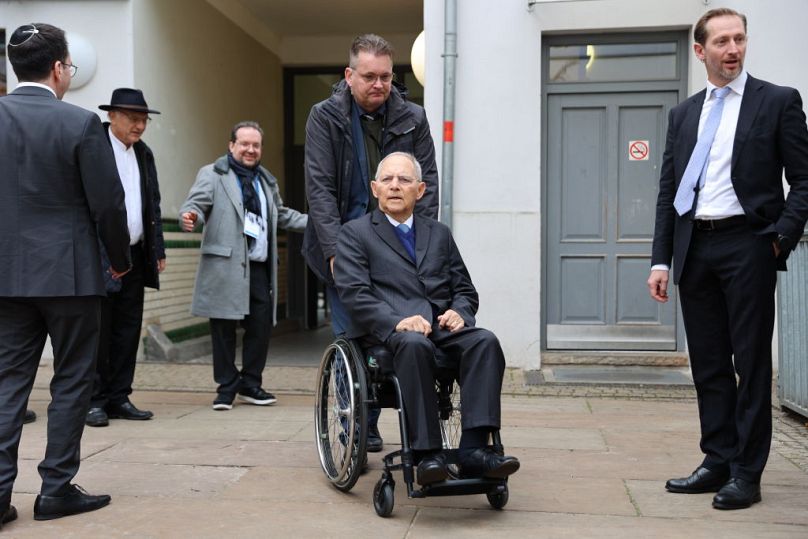The former statesman and finance minister during the euro debt crisis was also known for his role in the reunification of Germany.
Wolfgang Schaeuble, who helped negotiate German reunification in 1990 and as finance minister was a central figure in the austerity-heavy effort to drag Europe out of its debt crisis more than two decades later, has died.
 ADVERTISEMENT
ADVERTISEMENT
 ADVERTISEMENT
ADVERTISEMENT
He was 81.
Schaeuble died at home on Tuesday evening, his family told German news agency DPA on Wednesday.
He became Chancellor Angela Merkel’s finance minister in October 2009, just before revelations about Greece’s ballooning budget deficit set off the crisis that engulfed the continent and threatened to destabilise the world's financial order.
A longtime supporter of greater European unity, he helped lead a years-long effort which aimed for deeper integration and a stricter rulebook.
After eight years as finance minister, Schaeuble cemented his status as an elder statesman by becoming the German parliament’s speaker - the last step in a long front-line political career that saw him overcome daunting setbacks. He remained a lawmaker until his death.
Schaeuble was confined to a wheelchair after being paralyzed from the waist down after he was shot at an election rally in 1990, just after reunification.
He returned to work just weeks later and, the following year, was credited with helping sway Germany’s parliament to move the reunited nation’s capital from Bonn to Berlin.
On his 70th birthday in 2012, Merkel described Schaeuble as “an architect of German unity, an architect of the government’s move, and currently an architect of a stable eurozone.”
Merkel said the veteran minister “embodies the long-term memory of the republic... without you, our country would look different.”
From the early days of Europe’s debt crisis, Schaeuble pushed for tougher rules to keep government deficits under control.
Berlin initially held out against bailing out Greece and other debt-laden countries, and critics charged that Germany’s reluctance to move increased the price tag.
When a left-wing Greek government under Prime Minister Alexis Tsipras was elected in 2015 on pledges to scrap the painful spending cuts and tax hikes demanded by creditors, Schaeuble took a tough line.
Later that year, he suggested that Greece could take a five-year “timeout” from the euro, but fell in line with Merkel’s insistence that a so-called “Grexit” was off the table.
Schaeuble was born 18 September 1942 in Freiburg. He worked as a tax official in his native southwestern state of Baden-Wuerttemberg before winning election to the West German parliament in 1972.
He first joined West Germany’s Cabinet in 1984, serving as Chancellor Helmut Kohl’s chief of staff for five years before becoming interior minister.
In that job, Schaeuble was a key West German negotiator as the country headed toward reunification with the communist east after the 1989 fall of the Berlin Wall.
He helped prepare the treaty that created the legal framework for unification on 3 October 1990.
From 1991 to 1998, Schaeuble served as parliamentary leader of Kohl’s conservative Christian Democratic Union. He finally became CDU leader after Kohl’s 16-year stint as chancellor ended in a 1998 election defeat.
However, in February 2000, after becoming implicated in a party financing scandal surrounding Kohl, he was replaced by Merkel.
Schaeuble was later touted as a candidate for Germany’s largely ceremonial presidency, but was passed over as Merkel chose former International Monetary Fund chief Horst Koehler.
He returned to the Cabinet when Merkel became chancellor in 2005 for his second stint as interior minister. He was an unexpected, but widely respected, choice as finance minister four years later.











